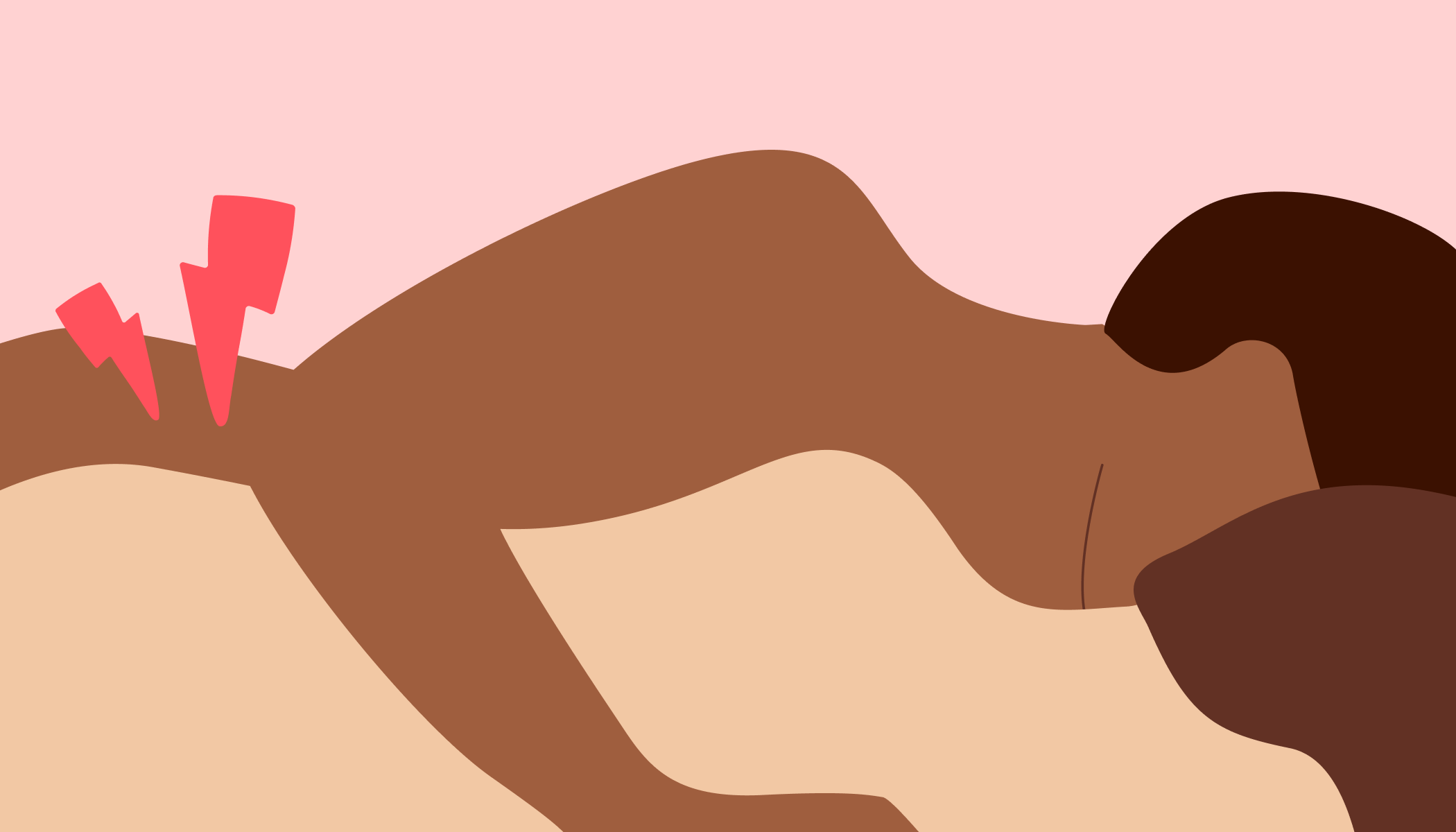Sex can be one of life’s great pleasures but occasionally, it can be painful and cause worry for both partners. While painful sex is more common in women, with an estimated 3 out of 4 affected at some point in their lives, around 5% of men are also thought to experience it.
‘Pain during or after sex is known as dyspareunia and there’s a variety of reasons why both men and women may experience it, including infections, illness, a physical or a psychological problem,’ says Dr Rhianna McClymont, Livi Lead GP.
‘Don’t be embarrassed to discuss it with a doctor. Medical professionals are used to dealing with things like this and your symptoms might be your body’s way of telling you it needs attention,’ she says.
Here, Dr McClymont shares some of the main reasons why you might experience painful sex.
1. An infection down there
There are two types of non-STI infections that may cause painful sex:
Thrush
This is an infection caused by the fungus candida albicans. Both men and women can suffer from it but thrush is more common in women, with around 75% experiencing it at some point in their lives.
‘Symptoms of thrush in women include itching and soreness, particularly around the entrance to the vagina, vaginal discharge which is often thick and creamy in appearance, and sometimes discomfort during sex,’ says Dr McClymont. ‘In men, it can present as irritation and redness in the skin of the penis.’
Thrush can be treated with over-the-counter antifungal pessaries or cream but if symptoms persist after treatment, you should see a GP.
You may be able to prevent further attacks of thrush by avoiding soap and shower gels on the genital area, wearing cotton underwear and avoiding tight jeans. It’s also wise to avoid sex while you have thrush to prevent passing it to a partner (although it’s not classed as an STI).
Cystitis
Up to 60% of women will experience a urinary tract infection (UTI) like cystitis at some point. In men, it’s less common and so men should seek medical help if they believe they are suffering from one of the symptoms, says Dr McClymont.
Symptoms in both sexes include a burning sensation when trying to urinate, feeling like you need to go to the toilet more often, cloudy or smelly urine and sometimes painful sex. Most mild cases in women will clear up on their own or with over-the-counter products from a pharmacy. But if you suffer from recurring bouts, or you have a temperature over 38C and pain in your lower back or side, see a GP as it may be a sign of a kidney infection.
An STI
Sexually transmitted infections like chlamydia or gonorrhoea can cause symptoms of painful sex, bleeding after sex (chlamydia), vaginal or penile discharge, pain when passing urine or for women, bleeding between periods (gonorrhoea). ‘But sometimes there are no symptoms at all. If you suspect you have an STI, it is important to see a GP or attend a sexual health clinic for tests and treatment.’
2. The effects of menopause
Painful sex is one of the most commonly reported problems in post-menopausal women. ‘During menopause, falling oestrogen levels lead to reduced vaginal secretions, which can cause dryness in the vagina, making sex uncomfortable or even painful,’ says Dr McClymont. You may also experience these symptoms in the years leading up to menopause, known as perimenopause.
‘Lubricants can help improve this dryness and can be bought from a pharmacy. But if symptoms persist, despite lubricants, you may wish to discuss other treatments with your GP such as topical hormone replacement therapy (HRT).’
3. Not being aroused enough
One of the key causes of painful sex may simply be down to lack of arousal. When a woman is aroused she produces more vaginal secretions, and this lubrication makes penetrative sex easier.
‘If you’re not aroused, you may not have produced enough natural lubrication to make sex comfortable. You can buy vaginal lubricants from a pharmacy to help with this, but it’s also important to explore and discuss any sexual problems or lack of arousal with your partner to see if there are things that you can do together to improve this. If there are other stressors in your life or problems that are affecting your libido, it’s important to address these or talk to a GP or counsellor.’
Read more about the causes of a low libido and what you can do to help.
4. Irritated or inflamed skin
‘Skin may become inflamed due to allergies or irritants like latex condoms, soaps or certain spermicides,’ says Dr McClymont. ‘If you have a skin condition such as eczema or dermatitis, and it’s present around the opening to the vagina or over the penis, it may cause dry, cracked and fissured genital skin that can lead to painful sex.’
Silicone-based lubricants can help in the short term, but it's important to get the underlying skin condition treated by a GP.
5. An underlying medical cause
Here are some of the medical conditions that can cause painful sex and why it’s important to get symptoms checked by a doctor.
Vaginismus
This is the automatic tightening and contracting of the muscles of the vagina at the point of intercourse, making sex either impossible or painful. It’s thought to be one of the most common female psychosexual conditions, although figures vary as to how many women suffer from it.
‘Vaginismus is an uncontrolled reaction and often happens due to fear of penetration,’ says Dr McClymont. ‘Treatment usually focuses on psychological help, relaxation techniques and exercises to help you become accustomed to penetration.’
Pelvic inflammatory disease (PID)
Although it’s not known exactly how many women suffer from PID, it usually affects women under 24. ‘Pelvic inflammatory disease is inflammation in the pelvis, normally caused by an infection,’ says Dr McClymont. ‘It may cause pain during sex, pelvic or abdominal pain, a temperature, vaginal discharge or vaginal bleeding. Pelvic inflammatory disease needs assessment and treatment by a GP, usually with antibiotics.’
Endometriosis
Around 1 in 10 women — an estimated 176 million worldwide — suffer with endometriosis. ‘It’s a condition where cells resembling those in the uterus grow in other places in the body, for example around the ovaries, and can cause painful sex in some women,’ says Dr McClymont. ‘It may also cause painful periods and abdominal pain’.
While there’s no known cure, there are different methods of treatment to manage the symptoms, including surgery, hormone treatment and pain relief.
Fibroids
‘These are benign growths in the womb which may cause no symptoms,’ says Dr McClymont. ‘But in some women they can cause painful sex, particularly if the fibroids are large and located close to the cervix.
Fibroids may also cause heavy menstrual periods, lower back pain and frequent urination.’ Treatment usually involves medicine from a GP but if your symptoms are particularly severe, surgery may be an option.
Phimosis
‘This is a condition where the foreskin is tight so cannot retract around the tip of the penis,’ says Dr McClymont. Although rare, occurring in about 1% of boys, phimosis can cause pain during sex if it continues into adulthood and is left untreated. ‘Discomfort may be improved by using condoms or lubricant, but if it continues to cause problems it’s best to speak to a GP.’
Inflammation of the prostate gland – ‘This is known as prostatitis and can cause pain around the penis, testicles, anus and lower back,’ says Dr McClymont. It can occur at any age and up to 10%-15% of the population may suffer with it at some point. ‘It also often causes pain when passing urine, or urinary frequency or urgency. Treatment with antibiotics is needed for acute prostatitis.’



